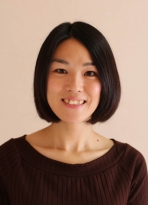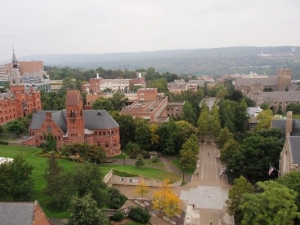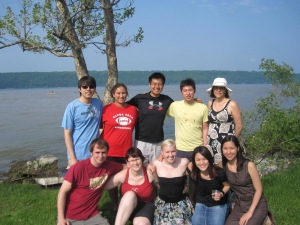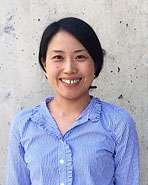| Award year | 2015 |
|---|---|
| Name of awardee | Asako McCloskey |
| Theme of the research that won the award | Molecular mechanisms underlying long-term maintenance of nuclear pore complexes in aging neurons. |
| Affiliation before overseas training | Ono Laboratory, Institute for Virus Research, Kyoto University (Japan) |
| Affiliation during overseas training | The Salk Institute for Biological Studies, MCBL-Z, Martin Hetzer Lab (USA) |
| Duration of overseas training | 2014 to present (as of 2017) |
Human Frontier Science Program (HFSP)
Messages from HFSP Fellowship Awardees
HFSP fellowship awardees offer advice to young researchers who are considering applying for the fellowship. We invite you to refer to their efforts and tips when preparing your English application or communicating with host institutions.
The point of the application is not to showcase your English skills but your ability to convey your enthusiasm, ideas and research plan in a simple and comprehensive way
| Award year | 2011 |
|---|---|
| Name of awardee | Aiko Sada |
| Theme of the research that won the award | Epigenetic regulation of stem cell fate acquisition in mouse skin |
| Affiliation before overseas training | Yumiko Saga Laboratory, Graduate University for Advanced Studies (Japan) |
| Affiliation during overseas training | Tudorita Tumbar Laboratory, Cornell University (USA) |
| Duration of overseas training | 2011 to 2016 |

Q1. Reason for applying for HFSP
I started looking for a postdoctoral research position in April 2010, which was one year before I was due to complete my doctoral course. I had never met Dr. Tumbar, but I found her research thrilling. I sent her an e-mail, praying for a good result. Fortunately, I was called in for an interview in July of the same year and was offered the position on the spot.

Cornell University Campus
Dr. Tumbar told me that she had grants sufficient to cover my employment but advised me that I should apply for a fellowship myself. She explained that she could not give assurances about the situation in the future and it would be a good boost for my career. So I applied for four fellowships inside and outside Japan, including HFSP. As a result, I received informal offers from three of them, and decided to go with the grant from HFSP, which offered the longest fellowship among the three.
For the HFSP fellowship, a change in research direction is one of the criteria for application. I changed my research from the germ cell development to research on epidermal stem cells. How you do things differently from others is most important in the world of science. Starting a new thing is hard but I chose a research area different from the one I studied during my PhD studies, believing that it would give me a competitive edge in the long run.
Q2. Advantages of HFSP
The following are what I consider to be the advantages of HFSP: (1) Because it is well known internationally, it is recognized as an achievement overseas. A postdoctoral researcher who has an HFSP grant may earn respect from others; (2) The duration of the fellowship is three years, which is the longest period available for a postdoctoral research fellowship. The allowance is high compared with other fellowships; (3) There were fewer restrictions on the research theme in the application process. HFSP takes an accommodating view toward basic research; (4) HFSP not only provides a living allowance but also research and travel allowances. These allowances are not overly restrictive and are easy to use; (5) HFSP takes an accommodating view toward life events. For example, when a researcher needs to discontinue her research temporarily to give birth or provide childcare, the researcher can still receive the fellowship and also can extend the duration; (6) Getting research funding has been very difficult in the US, too. As being a postdoctoral researcher is a rather unstable position, if you have a fellowship you do not have to worry about being laid-off suddenly.
Q3. Preparation for application
At the interview with Dr. Tumbar, I discussed with her my research theme and roughly sketched out the direction of my research. I subsequently worked out the details with her via e-mail.
Because the research theme was different from the one I had been pursuing and one that was completely new to me, my lack of knowledge became apparent once I started writing the application. I therefore started studying from the beginning in a step-by-step fashion, searching out the literature and reading it. Moreover, I was not confident about my ability in terms of writing English when I applied for HFSP. I tried to write in a logical manner using simple language. I vividly recall that when I nervously showed my draft to Dr. Tumbar, she pleasantly surprised me by complimenting me on the draft. I was really pleased to hear that.
It took me about two months from the start of preparation to completion of the application. As I had enough time to spare, I managed to elaborate the contents of the application to my satisfaction.
Q4. What I gained through the overseas training

First-Year Lab Party
I had a hard time at first because I could not achieve much from the research that I conducted during my time as a postdoc, but as I patiently proceeded with my research for a couple of years, I began to notice the aspects of the research that made me enthusiastic. I am proud that I eventually managed to complete it and complete it well. Working as a postdoctoral researcher overseas had a positive effect on me not only in terms of the research itself but also in terms of my life: it has broadened my view and changed my sense of value. Above all, producing something new through discussion with people from all sorts of backgrounds was a very valuable experience for me.
Science in Japan is unique and interesting; however, I get the feeling that Japanese scientists are disadvantaged by their limited English proficiency. Through the experience of working as a postdoctoral researcher in an English-speaking country, I improved my English ability markedly. In particular, I learned so much about how to write a paper in English.
Q5. Message to future HFSP applicants
When I applied for HFSP, I was not confident with my English but took on the challenge anyway, thinking I had nothing to lose. Some of you might hesitate because the application is supposed be written in English, but the point of the application is to show your ability to convey your enthusiasm, ideas, research plans and logical thinking in a simple and comprehensive way. So give it a try. Elaborating a plan before starting the research will definitely be an asset to you and is a perfect opportunity to improve, even if your application is turned down.

Since times have been tough for young researchers in Japan, some may be concerned that going outside the country and losing touch with Japanese researchers might make it harder to gain a position in Japan later on. I myself had less contact with Japanese researchers while I was away and was worried about whether I would be able to return to Japan and get a position as a researcher. Now my feeling is that you do not have to worry about gaining a position in Japan as long as you have made an achievement in your research. Working as a postdoctoral researcher overseas is a controversial issue, but personally I am sure that you can gain a tremendous amount from the experience. Even if you are uncertain about it, I hope you will give it a try.
The personal network and technological skills you acquire will be of great use to you when you are back in Japan

Q1. Reason for applying for HFSP
For my doctorate, I was investigating the transport of RNA from the nucleus to the cytoplasm and got interested in the nuclear pore complex, which plays a central role in the nuclear-cytoplasmic transport. Around that time, an innovative research was published from my current laboratory, which revealed that the proteins in nuclear pore complexes are extremely long-lived (the half-lives of these proteins can be an order of years). As damages to the proteins accumulate during the course of aging, this finding has a great potential to unveil the molecular mechanism of aging. In addition to this new field of aging, the various cutting-edge techniques in microscopes, which my current lab is well-known for, were attractive.. So I decided to change my field of research and applied to undertake the training in my present laboratory. Furthermore, I was also motivated by a desire to establish a global network with researchers here at the Salk Institute, and to observe the collaboration between academia and biotech companies that is actively conducted in San Diego, the city where the laboratory is located. I applied for HFSP because it has a high reputation among many postdoctoral researchers around me and also because a professor to whom I was indebted strongly encouraged me to apply.
Q2. Advantages of HFSP
HFSP has a high profile internationally and is recognized to provide excellent support for researchers. In my present laboratory there is a postdoctoral researcher applying for HFSP almost every year. Every year, a meeting of fellows is held somewhere in the world where you can learn about research in a variety of fields and establish a great network with other awardees. The major advantages of HFSP are that the HFSP fellowship allowance is provided for as long as three years and allowances are given also for research and travel expenses. The provision of a travel allowance enables us to attend academic meetings. It also covers the cost of returning to Japan to extend your visa. The support is so generous that, for example, HFSP fellows with children are entitled to receive an annual child allowance. In practice, scholarships in the US are often used for health insurance; however, the use of the HFSP fellowship is limited to research and travel costs. Furthermore, in the third year, you can apply for the Career Development Award, which supports research activities after you are back in Japan or working as an independent researcher.
Q3.Preparation for application
Regarding host institutions, I selected two laboratories in the field that interests me, including the laboratory where I am now. I visited both laboratories for interviews. (I believe the number of interviews I had was far less than other postdoctoral researchers, and I strongly encourage people to visit as many labs as possible.) I decided to undertake training at my present laboratory because I thought that the research was more appropriate for me and I had a feeling that I would get along well with the head of the laboratory and other members. When I prepared my CV, I tried to align my background and research interests with the interests of the laboratory. In the early stage of my preparations, I referred to the CVs of my acquaintances and senior colleagues who were already abroad for training. To ensure that the head of the laboratory read my CV, I expressed how interested I was in the research undertaken at the laboratory and how I could contribute to it in my cover letter. As for my application for HFSP, I discussed it and reviewed it many times with my current and old bosses in regard to various aspects such as novelty, originality and feasibility of experiments. I also consulted with other laboratory heads and personnel to gain objective advice. Finally, I asked my colleagues to correct my English, which was very important for me.
Q4.What I gained through the overseas training
First of all, I gained a network. Forming a favorable network with the head of the laboratory and other postdoctoral researchers working here is undoubtedly going to be useful for research I will conduct after returning to Japan as well as for my present research. Moreover, working with colleagues from various countries and with different backgrounds was a very valuable experience that let me learn about the world and enriched my life. In the institution where I am currently, people from different laboratories associate with each other through frequent collaborative research and socialize at events such as a happy hour. This helps you form a personal network outside your own laboratory. As we can exchange information casually among laboratories, we can update our troubleshooting or techniques quite easily. As for the research, in addition to the situation whereby collaborative research projects are conducted enthusiastically inside and outside the various institutions, core facilities equipped with cutting-edge technologies assist you to conduct your research. Core facilities are shared by all the labs in the Salk Institute and give us an easy access to the most up-to-date equipment and technology (e.g. RNA sequencing, super-resolution microscopes). The staff there help us to undertake difficult experiments. Furthermore, the foremost researcher in each field gives a seminar at the laboratory, which is very exciting and gives you broader insights.
Q5. Message to future HFSP applicants
Some points may overlap with those already mentioned in the previous section, but I think the network and expertise that you acquire during your overseas training will be of great use when you are back in Japan. When you apply to a host institution, it is important to show your enthusiasm in your CV and cover letter in such a way that the target institution takes an interest in you. In addition, a postdoctoral researcher funded by his/her own source of salary support such as a fellowship is welcomed. So if you mention that you are going to apply for HFSP in your application to the institution, it will be a plus factor. As only one person can apply for HFSP from one laboratory per year, it is important to show and let the boss know your willingness to apply for it. In preparing English documents, I recommend that you ask someone who has good English skills to check and correct them in the final stage of preparation. Being independent from your boss is strongly desired in HFSP applicants. So I suggest that you include your own ideas in a proactive manner. Last of all, you will need to make a major decision to go abroad for training, and you will no doubt be worried about language and cultural barriers. But actually, once you are there you will find that people will help you and that you will have a lot of fun and fruitful experiences. I sincerely hope that all of you can enjoy overseas training.
Last updated 06/10/19

